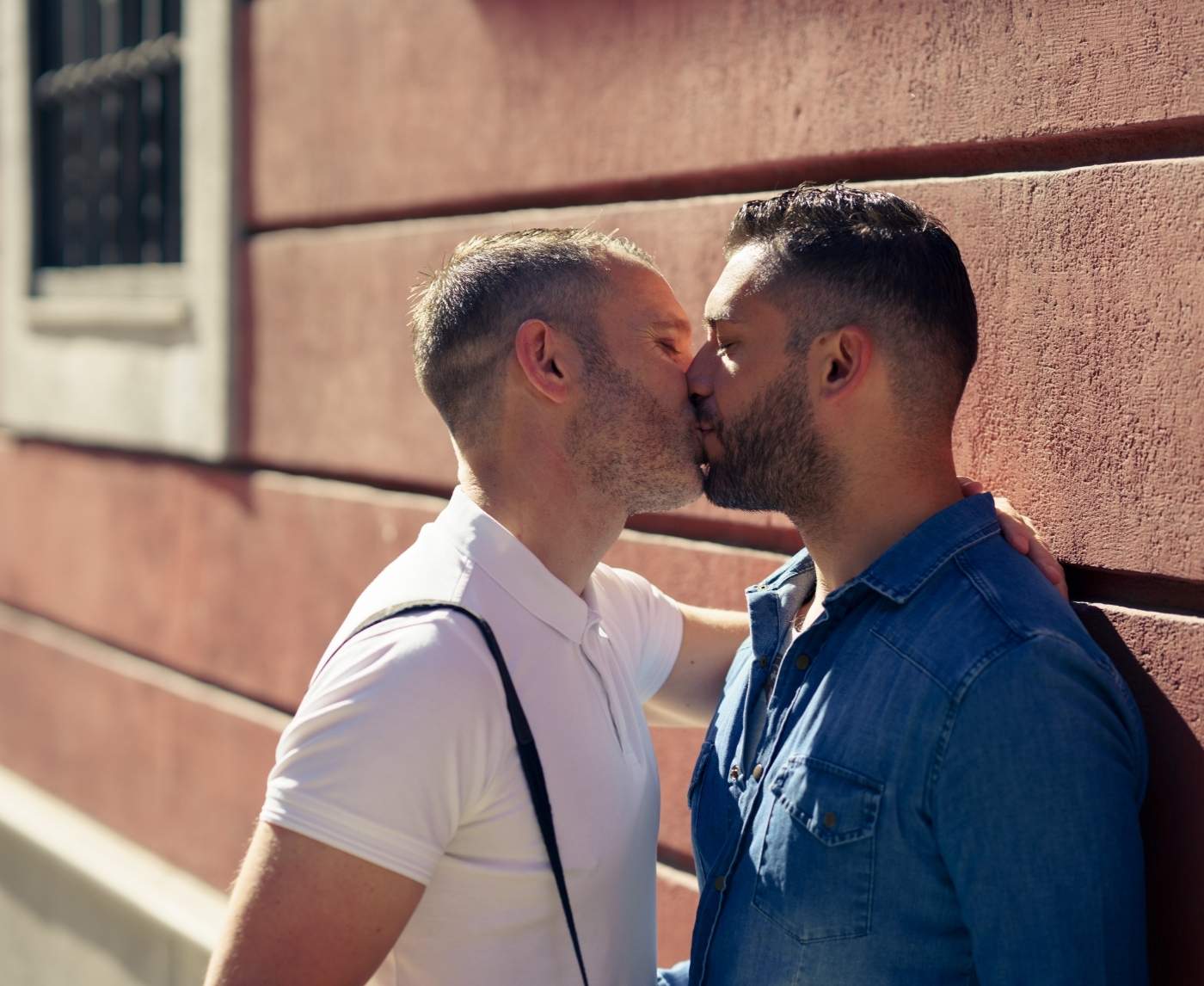Think a simple kiss is safe? Think again. HSV‑1, the virus behind most cold sores, and increasingly behind genital herpes, is way more common, and way more contagious, than people think. And it doesn’t always come with a warning sign.
This isn’t meant to scare you, it’s meant to empower you. Because understanding how oral herpes spreads is one of the most powerful tools in protecting yourself and others, especially when nearly 67% of the global population under age 50 has HSV‑1, according to the World Health Organization.
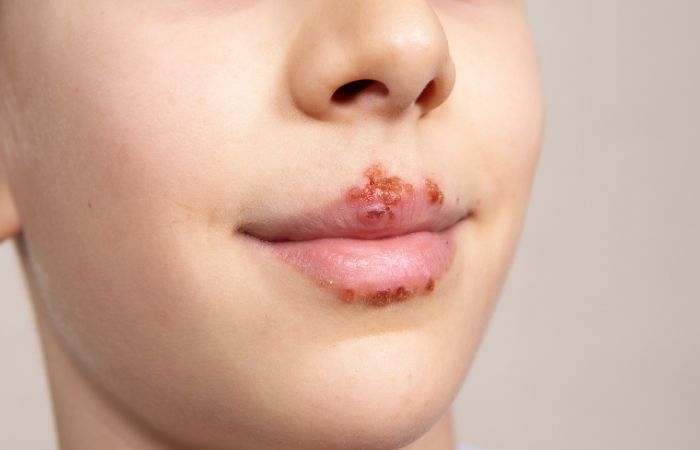
People are also looking for: Can you get herpes from someone who has no symptoms?
What Even Is HSV‑1?
Herpes Simplex Virus type 1 (HSV‑1) is a viral infection that usually causes oral herpes; think cold sores, fever blisters, or those annoying little outbreaks that show up around the lips or nose during stress, sickness, or sun exposure.
But here’s the plot twist: HSV‑1 isn’t just limited to your mouth. You can absolutely get genital herpes from oral sex with someone who carries HSV‑1 orally. And that’s becoming more common every year, especially in younger populations and people who assumed kissing was “safe.”
What makes HSV‑1 sneaky?
- Asymptomatic Shedding: The virus can be present in saliva even when there are no cold sores.
- Widespread Carriage: Most people with HSV‑1 don’t know they have it and may never show symptoms.
- Multiple Transmission Routes: It spreads through kissing, oral sex, sharing drinks, and even face-to-face contact in some cases.
Why You Might Not See It Coming: No Symptoms ≠ No Risk
HSV‑1 doesn’t always make a grand entrance. In fact, many people contract it from someone who never had a visible cold sore in their life, or just thought it was “chapped lips.”
This is called asymptomatic viral shedding, and it’s one of the main reasons herpes spreads so easily through kissing. You can carry and transmit the virus even when your skin looks clear and your lips feel fine.
One 2019 study in the journal STD found that oral HSV‑1 shedding occurred on about 9% of days in people who had no symptoms at all. That’s a pretty high chance of passing it to someone unknowingly.
How Kissing Becomes a Viral Highway
Kissing seems innocent until you realize it involves direct mucous membrane contact, saliva exchange, and often microscopic skin abrasions where viruses can enter.
HSV‑1 thrives in these environments. When someone with the virus (even without a cold sore) kisses another person, viral particles in their saliva or around their lips can transfer instantly. This is especially risky if:
- They have an active cold sore: this is the peak shedding phase.
- You have cracked lips or oral wounds: The virus has a direct path in.
- You’re immunocompromised: Your body’s defenses may be lower.
This doesn’t mean you should panic every time someone kisses your cheek, but it does mean we should rethink how “low-risk” kissing really is.
Check Your STD Status in Minutes
Test at Home with RemediumOral Herpes Test Kit

 For Men & Women
For Men & Women Results in Minutes
Results in Minutes No Lab Needed
No Lab Needed Private & Discreet
Private & DiscreetOrder Now $33.99 $49.00
What It Feels Like to Catch It from a Kiss
We don’t talk enough about the emotional weight of getting HSV‑1 from something as intimate, but as common, as kissing.
“I thought it was just a regular hookup. He didn’t have any cold sores. A week later, I had this burning spot on my lip that wouldn’t go away. When I finally got tested, I was shocked; it was herpes. I felt betrayed, but he didn’t even know he had it.”
Anonymous, 26
Most people don’t realize they’ve been exposed until they get their first outbreak. And while that can be painful, what hurts more for many is the shame, the stigma, and the “How could this happen from just a kiss?” spiral.
That’s why getting tested and talking about herpes status matters, even for things like kissing and oral sex. The herpes stigma thrives in silence. Talking kills it.
Why Genital Herpes from Kissing Is More Common Than You Think
Here’s where things get a little mind-blowing: HSV‑1 is now responsible for a huge number of new genital herpes cases. How? Through oral sex.
That means someone with cold sore HSV‑1 (even if they’re not showing symptoms) performs oral sex, and the recipient ends up with genital HSV‑1. This is especially common in younger adults who grew up thinking that oral sex doesn’t “count” for STD risks.
A study published in JAMA found that more than 50% of new genital herpes cases in some regions are caused by HSV‑1, not HSV‑2. And many people don’t know which one they have, because most doctors don’t routinely test for type unless you specifically ask.
What Cold Sores Actually Mean, And Why They’re Not “Just a Skin Thing”
Cold sores are herpes. Let’s stop pretending they’re not.
When people dismiss a cold sore as “just a fever blister” or “something I get when I’m stressed,” they’re skipping over a critical truth: that blister is a visible symptom of HSV‑1. And while most cold sores heal within 10–14 days, the virus never really leaves. It retreats into nerve cells, waiting for its next flare-up.
Triggers can include:
- Stress or fatigue
- Illness or fever
- Sun exposure
- Hormonal shifts (like menstruation)
- Oral trauma (dental work, chapped lips)
Every time a cold sore appears, the virus is reactivating, and you’re highly contagious. But what most people don’t realize is that you’re also potentially contagious before and after the visible sore. This is the window when kissing becomes risky without anyone knowing it.
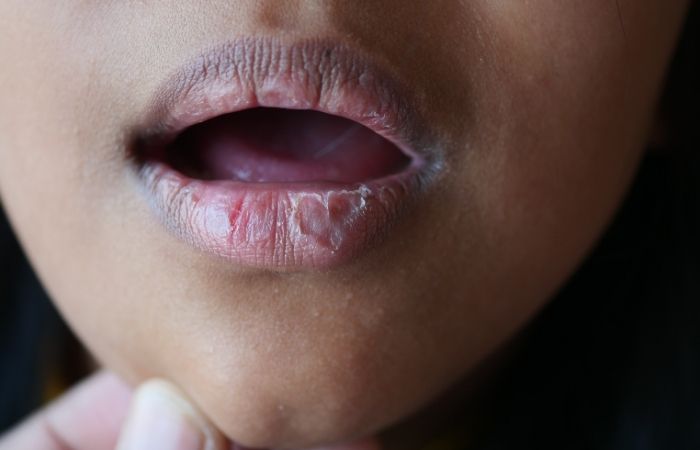
People are also looking for: Can herpes affect fertility or pregnancy?
Why We Don’t Talk About Oral Herpes, And Why We Should
There’s a reason the phrase “cold sore” gets tossed around so casually. Society has done a remarkable job of sanitizing oral herpes, making it sound like a cosmetic issue instead of a lifelong viral infection. The result? A total disconnect between the stigma of genital herpes and the silence around HSV‑1.
But here’s the thing: oral herpes is herpes. It’s the same family, it causes the same lifelong viral pattern, and it can still be emotionally devastating, especially when someone finds out they were infected through something as intimate and common as kissing.
“I grew up thinking herpes was something that happened from being reckless. I was 19, had never had sex, and ended up with HSV‑1 from a guy I kissed at a party. The cold sore came a week later. I remember Googling for hours, crying. I had no idea this could happen.”
Riley, 22
That’s why we need to talk about it more, without shame, without judgment, and with real facts that empower people to protect themselves and each other.
Testing for HSV‑1: Why Most People Don’t Know They Have It
Here’s one of the herpes world’s worst-kept secrets: most STD panels don’t automatically test for HSV‑1 or HSV‑2.
Unless you’re having symptoms or you specifically request a herpes type-specific test, many doctors won’t screen for it. That’s partly because of the high prevalence and partly because many people with herpes live perfectly healthy, asymptomatic lives. But it’s also why most people who carry HSV‑1 don’t know it.
Want to know for sure? You can take a type-specific test from the comfort of home. Check out the Herpes Home Test Kit; it’s discreet, fast, and can detect both HSV‑1 and HSV‑2.
How to Talk About Herpes, Yes, Even the “Kissing Kind”
Having “the talk” isn’t just for sex anymore. If you know (or suspect) you have HSV‑1, and you’re about to kiss someone new or perform oral sex, disclosure matters. It’s not about scaring someone; it’s about giving them a real choice.
Here’s how you can approach it:
- Be factual: “I carry HSV‑1, which causes cold sores. It’s really common and usually harmless, but it can be contagious even when I don’t have symptoms.”
- Offer context: “Most people get it in childhood. I didn’t know I had it until a few years ago.”
- Empower them: “We can avoid kissing if I feel a flare coming, or use barriers for oral sex.”
Most people appreciate honesty more than you’d expect. And with over half the population carrying HSV‑1, there’s a good chance your partner has it too, even if they don’t know it yet.
Check Your STD Status in Minutes
Test at Home with RemediumGenital & Oral Herpes Test Kit
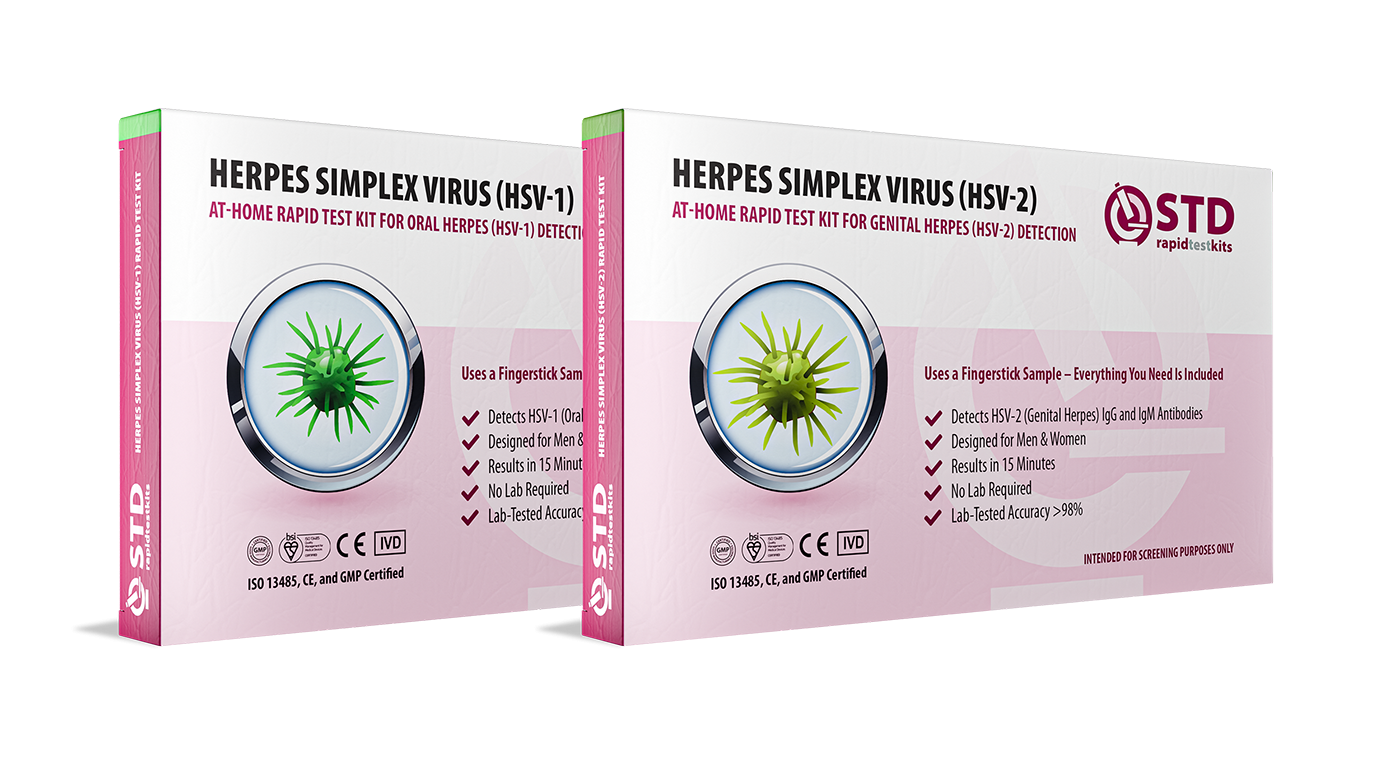
 For Men & Women
For Men & Women Results in Minutes
Results in Minutes No Lab Needed
No Lab Needed Private & Discreet
Private & DiscreetOrder Now $75.00 $98.00
For all 2 tests
Prevention: What Actually Helps (and What Doesn’t)
You can’t always prevent HSV‑1, but you can reduce your risk dramatically with a few smart steps:
- Don’t kiss or share drinks when someone has a cold sore.
- Avoid oral sex if there are any lip symptoms. Yes, even “just a crack.”
- Use dental dams or condoms for oral-genital contact. Not romantic, but very effective.
- Manage stress, sun, and illness to prevent outbreaks. These are common triggers.
- Take suppressive antiviral meds if you get frequent cold sores. This can reduce shedding.
There’s no vaccine yet for HSV‑1, but several are in development. Until then, prevention is about knowledge, honesty, and smart risk reduction.
Expert Voices: What Doctors Want You to Know
According to Dr. Christine Johnston, a leading herpes researcher at the University of Washington,
“Oral HSV‑1 is a highly contagious infection, but it’s also very manageable. With better education and testing, people can make safer choices and reduce spread without shame.”
Experts agree: the key is normalizing the conversation. As long as oral herpes is treated like an embarrassing skin issue instead of a real STD risk, people will keep unknowingly passing it through kisses, hookups, and unspoken assumptions.
The good news? You now know better, and you can help others get there too.
From Ancient Shame to Modern Silence: A Herpes History You Didn’t Learn in Sex Ed
Herpes isn't new. It's ancient. References to herpes-like sores show up in Greek texts dating back to Hippocrates. The word “herpes” itself comes from the Greek word herpein, meaning “to creep,” describing how the sores spread across the skin.
Fast forward a few thousand years, and herpes has morphed from folklore to moral panic. In the 1980s and ’90s, pharmaceutical marketing and tabloid media turned herpes into a social death sentence, despite it being common, mostly manageable, and often symptomless.
And while public discourse has shifted around many STDs, oral herpes still flies under the radar. Because it doesn’t feel like “real” herpes. Because cold sores are treated like an inconvenience, not an infection. That silence? It’s part of the problem.
It’s time to rewrite the narrative. HSV‑1 is real. It spreads through kissing. And you deserve to know how to spot it, prevent it, and talk about it without fear.

People are also looking for: Can one antibiotic cure all STDs?
Debunking the Cold, Hard Myths
Myth: “You can’t get herpes from someone without a cold sore.”
Truth: You absolutely can. HSV‑1 sheds even without symptoms.
Myth: “Only promiscuous people get herpes.”
Truth: Most people get HSV‑1 in childhood, or from a single kiss.
Myth: “Oral herpes isn’t an STD.”
Truth: It’s a sexually transmissible infection. Oral sex counts.
Myth: “You’ll always know if you have it.”
Truth: Many people carry HSV‑1 and never have a single symptom.
Knowledge is power. And myth-busting is how we start treating herpes with the seriousness and compassion it deserves.
Why You Might Not Know You Have Herpes (Yet)
Here’s the sneaky part about oral herpes (HSV-1): most people don’t realize they’re carrying it until it’s already been passed on. That’s not carelessness; it’s biology. HSV-1 often starts off quiet, dormant, or misread as a cold sore, a pimple, or even just dry lips. It doesn't always look like the textbook photos you've seen, and symptoms may not appear for weeks, months, or even years.
In fact, according to the CDC, nearly 50% of Americans under 50 have HSV-1, and most don’t know. Why? Because the first outbreak might be so mild it gets mistaken for something else, or it might never come at all. Some people only find out because a partner gets tested, or because they happen to spot a tingle during a routine check-up.
And because HSV-1 is mostly transmitted through kissing, oral sex, or skin-to-skin contact, it’s not like you had to “do something risky” to get it. You could be the cleanest, most responsible kisser on earth, and still carry herpes. That’s the emotional reality no one talks about.
Whether you're dealing with a recent diagnosis or just now realizing your last partner never got tested, it's okay to feel overwhelmed. But knowing is power. And getting tested is how you take back the reins. You can do that discreetly and easily with our Oral Herpes-1 At-Home Rapid Test Kit from home.
Check Your STD Status in Minutes
Test at Home with Remedium10-in-1 STD Test Kit
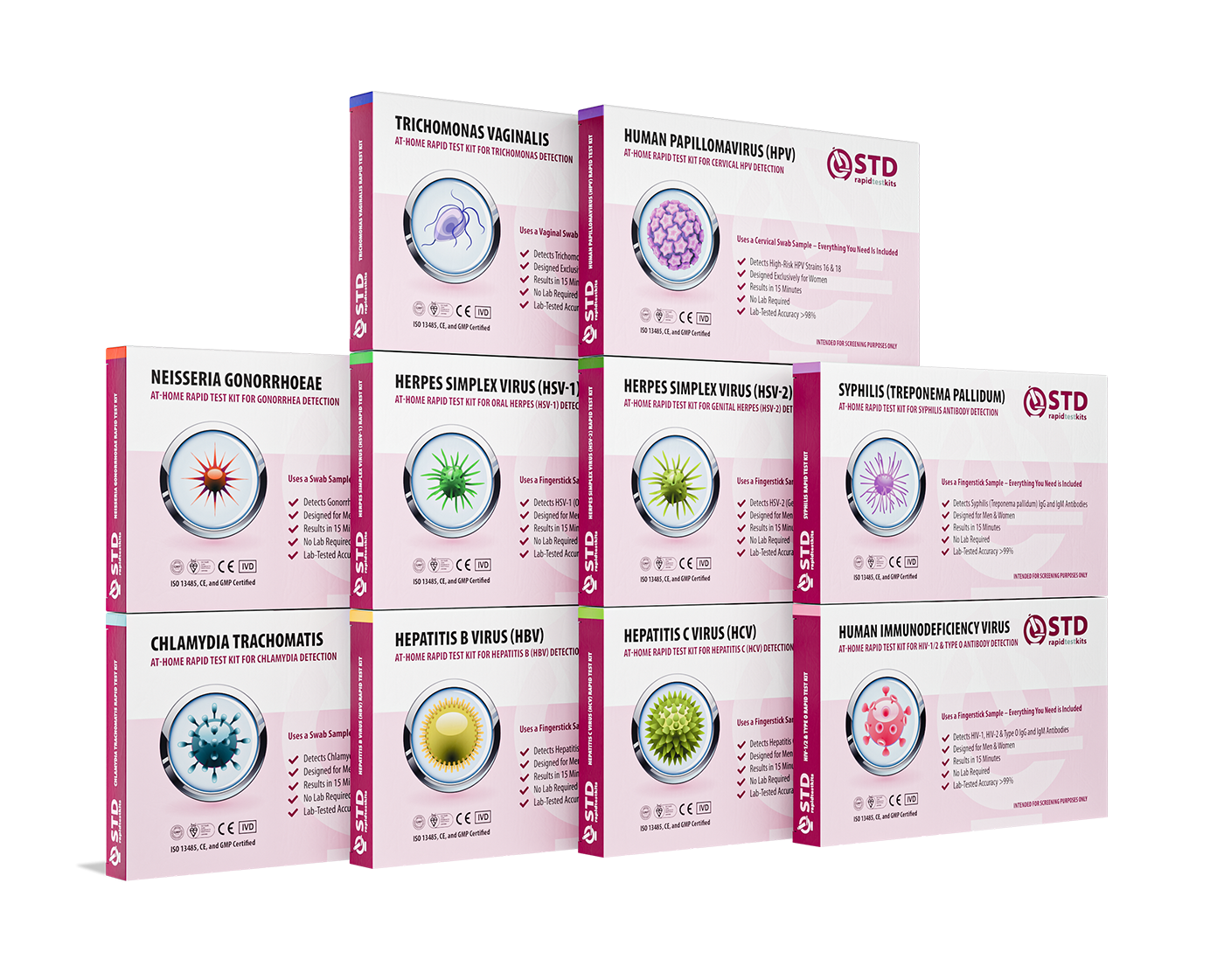
 For Women
For Women Results in Minutes
Results in Minutes No Lab Needed
No Lab Needed Private & Discreet
Private & DiscreetOrder Now $189.00 $490.00
For all 10 tests
Dating with Herpes: It’s Not a Dealbreaker
So let’s talk about what happens after you find out. You’ve got HSV-1, maybe from a past hookup or an old partner who never had symptoms. Now what? Does that mean you’re doomed to rejection? Absolutely not.
This might surprise you: more people have herpes than are willing to admit it. Once you start talking about it openly (or swipe through dating apps with “herpes-friendly” filters on), you’ll find you’re far from alone. Many people with HSV-1 live fully romantic, sexy, long-term relationship-filled lives and never pass it to a single partner.
Disclosure doesn’t have to be scary. You don’t need to dump your trauma on a first date, but you do get to share your status in a way that’s confident, informed, and stigma-busting. Try this: “I carry HSV-1, which is super common and manageable. I take care of my health, and I’m always transparent about it.” That’s not just responsible; it’s attractive.
Bottom line: having herpes doesn’t make you less worthy of love, sex, or intimacy. It just means you’re human, and now you’re a little more informed than most.
FAQs
1. Can you get herpes from a single kiss?
Yes. If the person is shedding HSV‑1, even without a visible cold sore, it can be passed during a single kiss.
2. Is oral herpes considered an STD?
Yes, HSV‑1 is a sexually transmissible virus, especially through oral sex. It’s just more socially accepted than genital herpes.
3. Can you spread HSV‑1 without symptoms?
Absolutely. It’s called asymptomatic shedding, and it’s one of the most common ways HSV‑1 is transmitted.
4. What does a herpes cold sore look like?
Typically, it starts with tingling or itching, followed by a cluster of small blisters on or around the lips. These break, crust over, and heal in 1–2 weeks.
5. How long after kissing someone can symptoms appear?
HSV‑1 symptoms usually show up 2 to 12 days after exposure, but some people don’t get symptoms for months, or ever.
6. Should I avoid kissing someone with a cold sore?
Yes. Avoid direct contact with active cold sores, and consider delaying kissing until fully healed.
7. How do I know if I have HSV‑1?
You can get a blood test that looks for HSV‑1 antibodies, or use an at-home Herpes 1 Rapid Test Kit.
8. Is there a cure for HSV‑1?
No cure exists, but antiviral meds can reduce outbreaks and contagiousness. Many people never experience symptoms after the first outbreak.
9. Can HSV‑1 become genital herpes?
Yes. HSV‑1 can cause genital infections through oral sex. That’s how many younger people contract genital herpes today.
10. Does using lip balm or sunscreen help?
Yes. Protecting your lips from sunburn and dryness can help prevent outbreaks if you carry HSV‑1.
You're Not Alone.
Let’s get real: herpes from kissing is a thing. It’s not rare. It’s not dirty. It’s not something that only happens to “other people.”
HSV‑1 is so common it’s almost ordinary, but the emotional toll, the shame, the awkward silences? That doesn’t have to be part of the story. You deserve to know what’s happening in your body. You deserve partners who talk openly. You deserve health care and testing that doesn’t make you feel gross or guilty.
Want to take control of your status? STD Rapid Test Kits has you covered. From discreet shipping to fast results, you can find out what’s really going on without leaving your house.
Whether you’ve had a cold sore, kissed someone who did, or just want peace of mind, the Herpes 1 Rapid Test Kit is a smart, shame-free first step.
You are not alone. You are not broken. And you are absolutely not the first person to Google, “Can you get herpes from kissing?”
Sources
1. WHO: Herpes Simplex Virus Facts
2. Mayo Clinic: Cold Sores Overview
3. Healthline – Can You Get Herpes from Kissing? And 14 Other Things to Know
4. Medical News Today – Herpes from kissing: Is it possible?
5. American Sexual Health Association – Can I Get an STI from Kissing?






